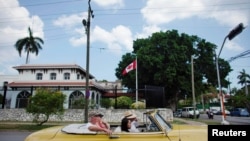Cubans were dismayed on Thursday to learn Canada's embassy in Havana was no longer processing visa applications due to staffing cutbacks over unexplained health incidents among Canadian and U.S. diplomats in the Cuban capital.
Canada, which in January reduced its embassy to skeletal staffing, announced on Wednesday it would no longer process applications for visitor and residence visas or work and study permits.
The U.S. Embassy had already reduced staffing and stopped processing visa applications in 2017. Cubans have been forced to go to third countries for them, adding expense and difficulty.
Canada said in a statement Cubans could apply for a visa at an embassy in a third country or online but it was not clear if Cubans always had to pick them up abroad. Canada's foreign ministry did not immediately reply to a request for comment.
"It's terrible. Now I have to go to another country to try visit my sister in Canada," said Rossana Real, 52. Her sister emigrated more than a decade ago, and Real tries to visit her regularly.
Canadian and U.S. diplomats posted in Havana began complaining of unexplained dizziness, headaches and nausea in the spring of 2017. The cause of the mysterious illnesses has not been determined.
Hopes have dwindled for investigations to find a cause of the incidents. U.S. officials have accused Cuba of failing to keep diplomats safe, but Cuba has denied involvement and says anti-Castro politicians in Washington have manipulated the matter.
But Canada has good relations with Cuba. For decades it has been the Caribbean island's most important tourism market and is an important economic partner. More than a million Canadians visited Cuba last year.
"We never had problems with Canada," said Real. "This really surprised me."
The embassy situation is an added frustration for Cubans at a time that reforms to the beleaguered, centrally-planned economy have stalled.
While relations with Europe are steadily improving, they have plummeted with the United States and former Latin American allies like Brazil whose governments swung to the right.
A decline in aid from embattled ally Venezuela and a tighter U.S. trade embargo have resulted in shortages of even basic goods like eggs and flour.
Travel to the United States had already become an odyssey; now even travel to old ally Canada has become difficult.
"I would like to see my daughter and her husband but now I can't," said Hilda Pereira, 80, who arrived at the embassy with a granddaughter and was surprised to find it shut to the public. "If I can't go directly to Canada, I won't go."





